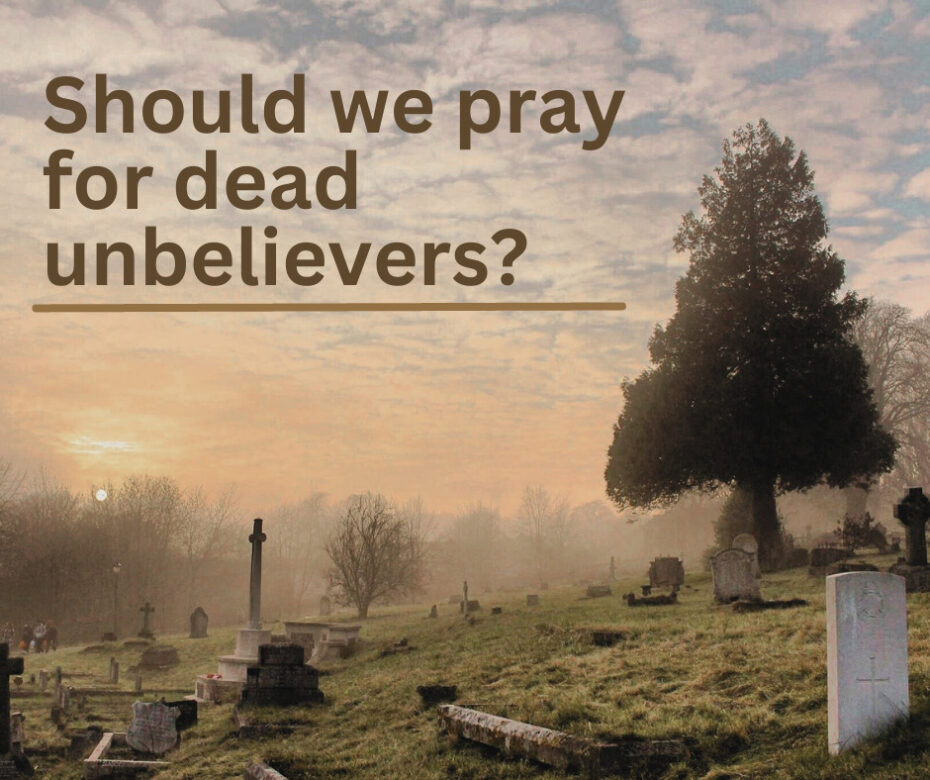It’s easy to get caught in a bubble. We unconsciously assume that the things we think or worry about are the things that everybody thinks and worries about. Every now and then, however, our bubbles burst, and we realize that isn’t the case. Somebody will ask a question or discuss an issue that never occurs to us. Such conversations are startling. We might even comment that such ideas never entered our minds.
That happened to me recently. I was told that on some Christian discussion boards, some were wondering about people who have died. Two issues in particular have been discussed. The first is whether a person who never believed will get another chance to believe after they die. The second is related to the first: Should we pray for people who died in unbelief? Specifically, should we pray for the Lord to be merciful to them, or maybe pray that when they get that second chance, they will believe?
One reason these questions have never entered my mind is because I am older, have been around awhile, and have not heard such ideas discussed among Evangelicals. I was an Army chaplain for a long time and worked with people from many different theological backgrounds. I never met anybody calling himself an Evangelical who thought we should pray for the dead. The closest thing I ever heard to such an idea was when Catholics talked about praying to dead saints for help. Also, some Catholics will pray for certain dead people to be released from purgatory more quickly. From being around Mormon chaplains, I was also aware that Mormons will baptize themselves in the place of people who have died in order to give the dead people an advantage later. But every Evangelical I knew looked at such practices as not only silly, but heretical.
The author of Hebrews summarized the Biblical view of these issues when he said, “It is appointed for men to die once, but after this the judgment” (Heb 9:27). It would be hard to state it more directly than this. After a person dies, he awaits judgment. Praying for the person will accomplish nothing.
Nowhere in the Scriptures are we told to pray for the dead. In Luke 16:19-31, we have the famous account of the rich man and Lazarus. After the rich man dies, he wants Lazarus to go to the rich man’s brothers to warn them about the place in which the rich man finds himself. If God’s people could help the unbelieving dead get out of Hades by praying for them, how cruel was it that Abraham didn’t tell the rich man not to worry? Abraham could have told him that the prayers of the living would bring an end to his torment. He just needed to be patient. He would get another opportunity to believe.
The problem with an unbeliever who has died is not that people may or may not pray for him. The problem is that he does not have eternal life and cannot have it.i In order to receive that life, a person needs to be alive and to believe in Christ for it (John 11:26). Once a person is no longer physically alive, eternal life cannot be received.
In Rev 21:8, the Lord discusses those who are in the lake of fire. But this is after He has created the new heavens and the new earth. The majority of those in the lake of fire at this point have been dead for thousands of years. Why didn’t they believe after they died and were in torment like the rich man? Why didn’t they believe at the Great White Throne judgment? Why does the Lord describe their fate as eternal here (Rev 20:10, 15)? Couldn’t the people in eternity pray for them so that the people in the lake of fire could be taken out once they come to their senses and believe?
There is another reason we are not told to pray for the dead. Such a practice could easily lead to trying to communicate with them—to let them know we are praying for them. In the Bible, people talking to the dead, or trying to influence them, was a sign of serious spiritual decline (e.g., 2 Kgs 23:24). The Catholics and Mormons can serve as warnings to us.
We sometimes hear children praying for Satan and his demons, asking God to save them. We know from Hebrews 2 that Christ did not die for them, so it is impossible for them to be saved. We might even smile at the innocence of children. It is not cute, however, when adult Evangelicals pray similarly for unbelievers who have died. We should know better.
__________
i There is, of course, an age of accountability. I’m speaking of people who die in unbelief after they have reached that age. We have a number of articles on our website about that. See this November 2020 blog by Bob and this May 2019 blog by Bob.


